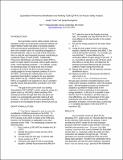Quantitative Phenomena Identification and Ranking Table (QPIRT) for Reactor Safety Analysis
Author(s)
Buongiorno, Jacopo; Yurko, Joseph P
DownloadBuongiorno_Quantitative phenomena.pdf (93.52Kb)
OPEN_ACCESS_POLICY
Open Access Policy
Creative Commons Attribution-Noncommercial-Share Alike
Terms of use
Metadata
Show full item recordAbstract
Next generation reactor safety analysis codes are intended to make use of advanced numerical methods and higher fidelity models with built-in sensitivity analysis (SA) and uncertainty quantification (UQ) [1]. However, due to the complex nature of uncertainty propagation in thermal-hydraulic codes, it is crucial to first narrow the focus to only the most important processes contributing to a particular figure of merit (FOM). Uncertainty propagation in the safety code is then performed through those dominant controlling phenomena. Traditionally, Phenomena Identification and Ranking Tables (PIRTs) based on expert opinion have been used to guide selection of the "most important processes." But in the present context, uncertainty propagation must be performed on the dominant processes as "viewed" by the safety code itself. Therefore a PIRT-like methodology must be applied to rank processes from the safety code's point of
view.
Date issued
2011-06Department
Massachusetts Institute of Technology. Department of Nuclear Science and EngineeringJournal
Transactions of the American Nuclear Society
Publisher
American Nuclear Society
Citation
Yurko, Joseph, and Jacopo Buongiorno. "Quantitative Phenomena Identification and Ranking Table (QPIRT) for Reactor Safety Analysis." Transactions of the American Nuclear Society, Vol. 104, Hollywood, Florida, June 26-30, 2011.
Version: Author's final manuscript